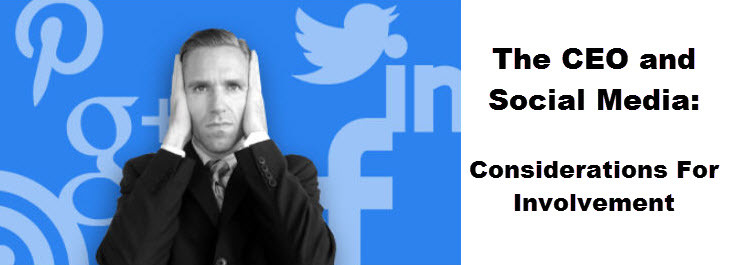Chief Executive Officers act as the faces of businesses, but some businesses are still murky about whether or not it’s a good idea to involve them in social media strategies.
- Is social media a good use of a CEO’s time?
- What value does it contribute to the business?
- Should a CEO be involved in social media strategies?
These are the typical questions asked when any level of leadership begins to use new technology.
Here are some factors to consider:
1. Research – The Executives Chime In
In a 2013 survey by Weber Shandwick and KRC Research, nearly 90 percent of 630 executives from companies with revenues of at least $500 million stated they had one or more social media accounts. Those executives also supported the use of social media by CEOs. When asked what benefit social media brings to the company, they responded:
- It gives the company a human face
- It helps the CEO communicate with the company’s employees
- It fosters a relationship with news media
- It shows the use of innovation by the company
- It has a positive impact on the business’ reputation
- It enhances the CEO’s reputation as a good communicator
2. Knowledge – Expanding the CEO Role
CEOs are leaders in their industries, and know their business inside and out. This makes them the ideal spokespeople for companies in those industries, which we covered here in an earlier post. Innovation springs out of the minds of CEOs, and social media is one way to communicate some of the excitement that comes with those ideas. It can provide a glimpse into the future. Social media has proven itself to be a quick source of information across the globe.
The current CEO of Ernst & Young and former assistant secretary of the U.S. Treasury for Tax Policy, Mark Weinberger, used Twitter to comment on his recent assignment as Ernst & Young Chairman and CEO. The value of this social media network is that it allows a brief message to be sent by a busy executive that may be viewed as critically important to their followers. In a time when it may be unthinkable for an executive to spend hours crafting a news release or article, tools such as Twitter provide ways to give the public greater access to a company’s direction.
3. Results – The Benefit to the CEOs
Social media is not only a good thing, but a necessary outlet for greater visibility. Companies that have adopted social media as a way to communicate with the public and news media are able to engage their customers and strengthen their connections. Companies that fall behind in this area may soon be questioned as to what they have to hide. The result will be a shift in market share to the companies who do embrace this way of connecting with people.
4. Crisis Management – The Risks to the CEO
CEOs are human, too, which means they can put their foot in their mouth like anyone else. That’s why some CEOs may hire their own PR people to make sure the right message is delivered. Others just take the risk of spreading messages themselves. The result can be something like the recent PR issues generated by statements made by Chick-fil-A and Netflix CEOs.
Within a matter of minutes, a poorly crafted message tweeted by a CEO can be seen by millions of people across the planet. The potential for great harm in using social media is just as strong as it’s potential for good.
Like all areas of communication, CEOs need to be educated about the proper use, timing and types of messages appropriate for social media. With that basis of understanding, social media can become another powerful communication tool for these business executives.
Do you think CEOs should use social media to promote their businesses? Tell us why or why not in the comments.
photo credit (Robert Scoble Picture): Thomas Hawk | cc
Jon Rognerud and Chaosmap work with Fortune 500 companies, small business and entrepreneurs to create digital traffic strategies that scale up customers, leads and sales with profitable returns. Mr. Rognerud wrote a best-selling book (Buy On Amazon), “The Ultimate Guide To Optimizing Your Website” (Entrepreneur). Connect directly here.







